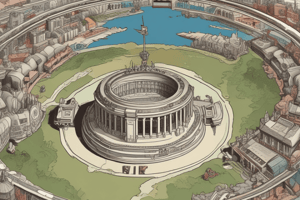Podcast
Questions and Answers
What is the primary role of the government?
What is the primary role of the government?
- To make and enforce rules, laws, and policies (correct)
- To provide education and healthcare
- To provide national security
- To manage the economy
What type of government is characterized by a single person holding supreme power?
What type of government is characterized by a single person holding supreme power?
- Authoritarian
- Republic
- Monarchy (correct)
- Democracy
Which branch of government is responsible for making laws?
Which branch of government is responsible for making laws?
- Legislative (correct)
- Judicial
- Administrative
- Executive
What type of government is characterized by power being held by the people or their elected representatives?
What type of government is characterized by power being held by the people or their elected representatives?
What is a presidential system of government characterized by?
What is a presidential system of government characterized by?
What is the primary function of the judicial branch of government?
What is the primary function of the judicial branch of government?
Flashcards are hidden until you start studying
Study Notes
Definition and Functions
- A government is a system or group of people that have the authority to make and enforce rules, laws, and policies for a country, state, or organization.
- The primary functions of a government include:
- Making laws
- Enforcing laws
- Providing public goods and services
- Regulating economic activity
- Representing the country internationally
Types of Governments
- Monarchy: A system in which a single person (monarch) holds supreme power.
- Republic: A system in which power is held by the people or their elected representatives.
- Democracy: A system in which power is held by the people, either directly or through elected representatives.
- Authoritarian: A system in which a small group or individual holds power, often without being accountable to the people.
- Totalitarian: A system in which a single party or leader has complete control over all aspects of life.
Branches of Government
- Legislative: The branch responsible for making laws, often composed of a parliament, congress, or assembly.
- Executive: The branch responsible for enforcing laws, headed by a president, prime minister, or monarch.
- Judicial: The branch responsible for interpreting laws, composed of courts and judges.
Systems of Government
- Presidential System: A system in which the president serves as both head of state and head of government.
- Parliamentary System: A system in which the head of government is the prime minister or chancellor, responsible to the legislature.
- Semi-Presidential System: A system that combines elements of presidential and parliamentary systems.
Other Key Concepts
- Sovereignty: The authority of a government to govern itself and its people.
- Federalism: A system in which power is divided between a central government and smaller, regional governments.
- Unitary System: A system in which power is held by a single, centralized government.
Studying That Suits You
Use AI to generate personalized quizzes and flashcards to suit your learning preferences.




